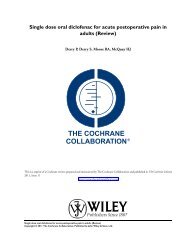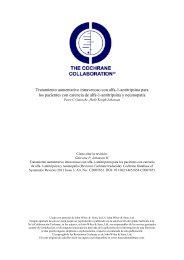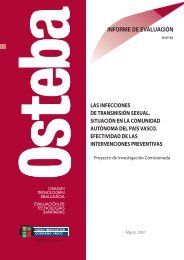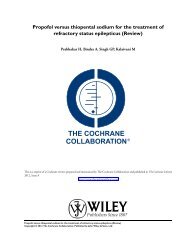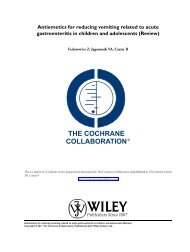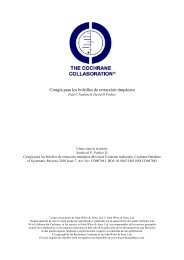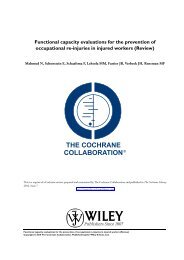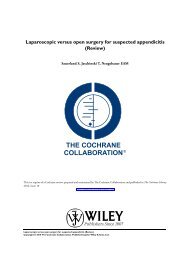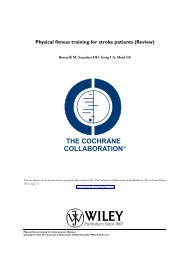Non-pharmacological interventions for caregivers ... - Update Software
Non-pharmacological interventions for caregivers ... - Update Software
Non-pharmacological interventions for caregivers ... - Update Software
You also want an ePaper? Increase the reach of your titles
YUMPU automatically turns print PDFs into web optimized ePapers that Google loves.
In<strong>for</strong>mal caregiver satisfaction<br />
One study (Mant 2000) assessed satisfaction with services and understanding<br />
of stroke using a caregiver satisfaction questionnaire<br />
(Pound 1993). The study reported that <strong>caregivers</strong> in the intervention<br />
group were more satisfied with their understanding of the<br />
causes of stroke (84% versus 72%, P = 0.04) but no more satisfied<br />
than the control group with their understanding of stroke (77%<br />
versus 65%, P = 0.06) and how to prevent another stroke (82%<br />
versus 71%, P = 0.06). No detail was provided on satisfaction with<br />
stroke services in hospital, at discharge or after. One study (Grant<br />
2002), assessing satisfaction with health care using the client satisfaction<br />
questionnaire (Larsen 1979), reported that <strong>caregivers</strong>’ satisfaction<br />
in the experimental and sham intervention groups remained<br />
comparable while the level of satisfaction decreased over<br />
time in the control group; no data were reported. Another study<br />
(Hartke 2003) assessed caregiver satisfaction with the characteristics<br />
of the intervention using a measure developed specifically <strong>for</strong><br />
that purpose; however, no assessment was made comparing satisfaction<br />
in the intervention groups versus the control group.<br />
In<strong>for</strong>mal caregiver mortality<br />
No study collected data on in<strong>for</strong>mal caregiver mortality.<br />
D I S C U S S I O N<br />
Summary of main results<br />
There is currently insufficient data to support or refute the use of<br />
’in<strong>for</strong>mation and support’ <strong>interventions</strong> or ’psycho-educational’<br />
<strong>interventions</strong> <strong>for</strong> in<strong>for</strong>mal <strong>caregivers</strong> of stroke survivors to reduce<br />
or prevent caregiver-specific stress and strain, general stress or distress,<br />
depression, anxiety or health-related quality of life compared<br />
to no intervention or usual care. ’Teaching procedural knowledge’<br />
type <strong>interventions</strong> delivered to <strong>caregivers</strong> of stroke survivors, prior<br />
to the stroke patient’s discharge from hospital, appear to reduce<br />
caregiver-specific stress and strain, general stress or distress, depression<br />
and improve health-related quality of life compared to<br />
usual care. However, this is based on data from one, small, singlecentre<br />
study.<br />
Overall completeness and applicability of<br />
evidence<br />
The goal of studies included in this review was either to evaluate<br />
a potential ’cure’ <strong>for</strong> a health state (e.g. depression) or social state<br />
(e.g. burden) or to identify measures to prevent the sequelae of<br />
providing in<strong>for</strong>mal care such as stress, depression, anxiety or decline<br />
in health-related quality of life.<br />
<strong>Non</strong>-<strong>pharmacological</strong> <strong>interventions</strong> <strong>for</strong> <strong>caregivers</strong> of stroke survivors (Review)<br />
Copyright © 2011 The Cochrane Collaboration. Published by John Wiley & Sons, Ltd.<br />
Unlike randomised controlled trials (RCTs) of patients (e.g. stroke<br />
survivors), where participants must have the disease in question<br />
to be admitted to the trial, the participants in the included studies<br />
are free-living individuals and are not defined by the presence<br />
of disease or ill health nor are they presenting <strong>for</strong> clinical care or<br />
under active health care. A major limitation of all the included<br />
studies is the lack of reporting of a detailed and precise definition<br />
of the index condition <strong>for</strong> a current in<strong>for</strong>mal caregiver, making<br />
it difficult to assess fully the merits and appropriateness of the<br />
included studies. In addition, inadequate characterisation of the<br />
in<strong>for</strong>mal caregiver study participants makes it difficult to know<br />
who the results of the study apply to and to replicate the studies<br />
in question. Moreover, an ambiguous eligibility criterion suggests<br />
a study that is not properly designed to evaluate the effects of the<br />
<strong>interventions</strong>; if a study population is chosen incorrectly, then the<br />
ability to detect a benefit is likely to be reduced. Furthermore, the<br />
substantial drop-outs witnessed across the included studies suggests<br />
that, in some instances, the intervention may not have been<br />
appropriate <strong>for</strong> the participants that were selected <strong>for</strong> enrolment<br />
in the study.<br />
Second, ’in<strong>for</strong>mal <strong>caregivers</strong>’ are perceived as individuals at high<br />
risk of adverse health outcomes. However, the effect of an individual’s<br />
in<strong>for</strong>mal caregiver classification/status on the same individual’s<br />
risk of incident ’health outcomes’ (including depression, anxiety,<br />
general stress and distress and health-related quality of life)<br />
is not a well-defined causal quantity and there<strong>for</strong>e has no obvious<br />
implications <strong>for</strong> <strong>interventions</strong>.<br />
Quality of the evidence<br />
The evidence in this review comes from eight studies from four<br />
countries carried out over the previous 12 years. The total number<br />
of participants was 1007. It is difficult to draw robust conclusions<br />
about the effects of <strong>interventions</strong> targeted towards in<strong>for</strong>mal <strong>caregivers</strong><br />
of stroke survivors as there is a lack of a precise definition<br />
of a current in<strong>for</strong>mal caregiver across all studies and in addition<br />
there are limitations in the study design and conduct of individual<br />
studies, which raise questions about the validity of their findings.<br />
Potential biases in the review process<br />
We believe that we have identified all the relevant RCTs. We have<br />
successfully contacted all except one of the original authors. We<br />
have sought any truly RCTs regardless of language of publication.<br />
All papers in any language other than English have been either<br />
translated or data have been extracted from the original paper by<br />
an individual proficient in the language of the paper.<br />
11



